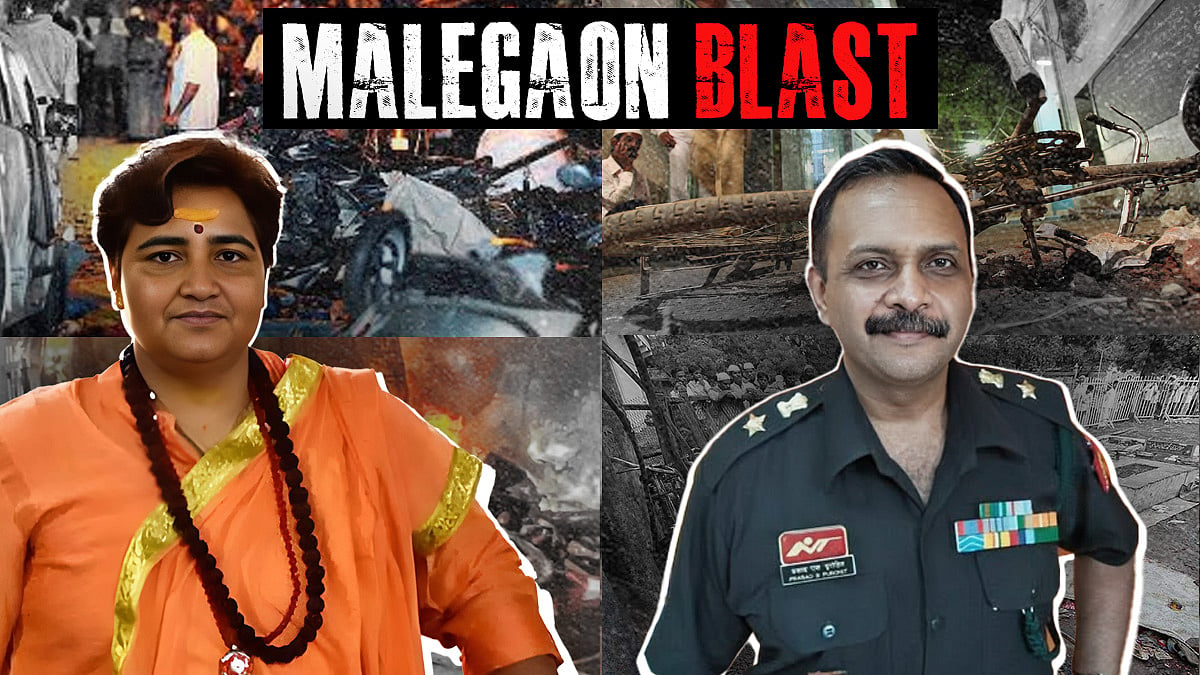2008 Malegaon Bomb Blast Case: Families Of Victims Approach Bombay HC, Challenging Acquittal Of All 7 Accused
The appeal filed through advocate Mateen Shaikh, seeks to set aside the acquittals of all the accused persons. It has also sought re-examination of key witnesses and missing evidence, which the victims allege were deliberately excluded or suppressed by a compromised prosecution.

2008 Malegaon Bomb Blast Case: Families Of Victims Approach Bombay HC, Challenging Acquittal Of All 7 Accused | FPJ
Families of six victims of the 2008 Malegaon bomb blast have approached the Bombay High Court challenging the acquittal of seven accused, including BJP MP Pragya Singh Thakur and Lt Col Prasad Purohit.
About The Appeal
The appeal, filed through advocate Mateen Shaikh, assails the special NIA court’s July 31 verdict claiming that faulty investigation or some defects in the probe cannot be the ground for acquitting the accused. Moreover, it states that a conspiracy is hatched in secrecy, and hence, there cannot be direct evidence of it.
Seeking quashing of the special court order, the appeal claims that the same was wrong and bad in law.
The appeal is likely to be heard by a bench headed by Justice Ajey Gadkari on September 15. The appeal was filed on September 2, however, it was registered on Tuesday.
About The Case
On September 29, 2008, an explosive strapped to a motorcycle detonated near a mosque in Malegaon, killing six people and injuring 101. The Maharashtra Anti-Terrorism Squad (ATS) initially arrested 11 persons. A decade later, only seven faced trial, while others were discharged. The NIA took over the probe in 2011.
On July 31, special judge AK Lahoti acquitted all seven accused observing that there was no “reliable and cogent evidence” against the accused that proved the case beyond a reasonable doubt. During the trial, the prosecution produced 323 witnesses, 9,997 documents and 404 articles. However, 34 witnesses turned hostile.
The families, however, contended that the trial court wrongly acted as a “post office” and failed to test the prosecution’s case against missing or hostile evidence. “The trial court has unfortunately acted as a mere post office and allowed a deficient prosecution to benefit the accused,” the petition states.
Families Cite Faulty Probe, Political Interference in Appeal
The appeal claims that faulty investigation or procedural defects should not have resulted in acquittals, especially in a terror case. It cites a Supreme Court’s ruling to argue that provisions of the Maharashtra Control of Organised Crime Act (MCOCA) should have been invoked as multiple charge sheets existed against at least one accused.
It also alleges that the NIA deliberately diluted the case. The petition points to former special prosecutor Rohini Salian’s public statement that she was pressured to go slow against the accused. Her replacement, the petition claims, lacked experience in terror trials.
ALSO READ
ALSO READ
The victims’ families say crucial evidence disappeared during trial, including 13 original documents — among them were original statements recorded before a magistrate. “Shockingly neither prosecution conducted any enquiry nor court ordered investigation or registration of FIR,” the petition states.
The appeal also questions the trial court for discarding evidence of intercepted communications and rejecting forensic reports for want of technical certificates.
Further, the appeal argues that conspiracy is “hatched in secrecy” and rarely proved by direct evidence. Hence, the testimonies of police witnesses, admissions by some accused, and the conduct of those who turned hostile should have been weighed cumulatively. The plea highlights one such admission by accused Ramesh Upadhyay, allegedly acknowledging his presence in conspiracy meetings.
“The lacuna of the investigating agency could have been checked by the learned judge, by exercising both the power and corollary duty under Section 165 of the Evidence Act,” the petition adds.
The families also allege political interference in the case. “The NIA was introduced only to weaken the case and give benefit to accused persons,” the appeal claims, stressing that no blasts targeting minorities occurred after the ATS arrests in 2008.
The appeal has urged the high court to quash the acquittal order and convict the accused.
RECENT STORIES
-
-
-
-
-